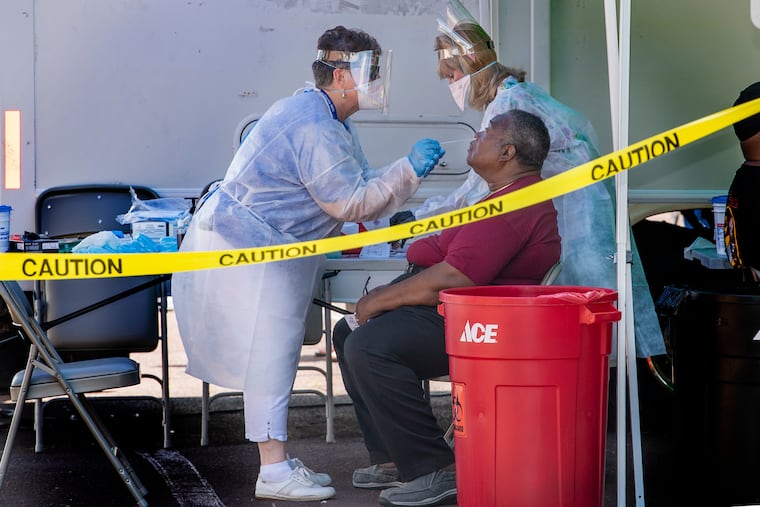The U.S. needs to democratize COVID testing | Opinion
We need to adopt the same proven model used to tackle the global HIV/AIDS epidemic: self-testing.

Right now, we stand on a precipice. Global disruption like the world is currently experiencing presents an opportunity for each one of us to stand up and be on the right side of history. We are grappling with the COVID-19 pandemic and its implications for public health. At the same time, protesters have taken to the streets to speak out against decades of systemic, pervasive racism.
These two issues are deeply connected. It has been well understood that advanced age and preexisting conditions increase the chance of becoming very sick with COVID-19. Initiatives such as the COVID Racial Data Tracker opened a window into the effect of COVID on communities of color. However, it wasn’t until the CDC’s more comprehensive morbidity and mortality data were made public (after a lawsuit) that it became frighteningly clear that vulnerable communities were bearing an undue burden.
Again.
Looking at 640,000 infections detected in almost 1,000 communities, the data showed that Latinos and Black people were three times as likely to become infected with COVID-19 — and nearly twice as likely to die from COVID-19 — as white people.
Despite months of learnings to draw from, testing problems in today’s rapidly expanding list of hot spots reflect a spectrum of failures:
Residents of predominantly Latino south Phoenix waited for hours in scorching heat to take a COVID-19 test in June. Despite spiking infections, Sacramento County announced they were closing five coronavirus testing sites in underserved communities due to a growing shortage of testing materials. And Pennsylvania, like many states, continues to struggle with testing and has faced a shortage of supplies and delayed lab test results. Resources for Black communities were falling so short in Philadelphia that Ala Stanford filled a van with tests and administered them — for free — to people lacking access to medical care.
COVID-19 is yet another systematic disenfranchisement of Americans of color. This is why we must democratize COVID-19 testing and ensure that communities of color have equal access to health care and knowledge about their health status.
Fortunately, we are closer than you might think. One strategy is to adopt the same proven model used to tackle the global HIV/AIDS epidemic: self-testing.
» READ MORE: Pa. wants to expand coronavirus testing but faces a shortage of supplies and lab result delays, Wolf and Levine say
Rapid self-testing can move the needle by providing tests — and results — to anybody, anywhere, anytime. Self-tests give people a result within minutes, with no instrumentation needed to interpret the results, and no need to transport samples to a lab for processing. Home pregnancy tests may be the best-known example, but self-tests are available for HIV, too.
In sub-Saharan Africa, the proportion of people with HIV who knew their status had almost doubled to 81% between 2015 and 2018, according to a report by the STAR Initiative, UNITAID, and the World Health Organization.
The reason? A combination of HIV self-tests that could easily be administered in-home, and the concerted efforts of governments and civil society. Outreach workers literally put kits in their backpacks and distributed them door to door.
Rapid self-testing like this could help prevent the spread of COVID amongst our most vulnerable communities in the United States and around the world. Imagine the impact of a test that would not require a trip to a testing site or lab.
This vision is already on the way to becoming a reality. For example, scientists at my company are racing to bring a rapid self-test that would confirm active infection by detecting viral proteins (antigens) to market by year-end. To date, there are no COVID-19 tests for active infection like this one, which would provide a result at the collection point with no need for an instrument to interpret the results.
» READ MORE: Schools can’t reopen safely without better COVID testing for kids, say these Philly pediatricians l Expert Opinion
Collaboration between the public, private, and nonprofit sectors can help bring tests like these to scale. A recent report on testing from the Rockefeller Foundation says an additional $75 billion in federal funding should be earmarked to make tests accessible to everyone and ensure that low-income and minority communities are adequately served. The report goes on to say this is the “best investment America could make in averting an even more tragic and pending disaster.”
All people, regardless of zip code, skin color, or primary language, deserve access to accurate diagnostics, effective treatment, and preventive vaccines. With a reliable COVID-19 self-testing model, like the one successfully adopted for HIV, we can democratize testing for the future health of all.
Let’s eliminate disparities, not add to them. Let’s not let testing become yet another wedge that separates us.
Stephen S. Tang is the president and chief executive officer of OraSure Technologies Inc. in Bethlehem. A version of this piece first appeared in the Morning Call.